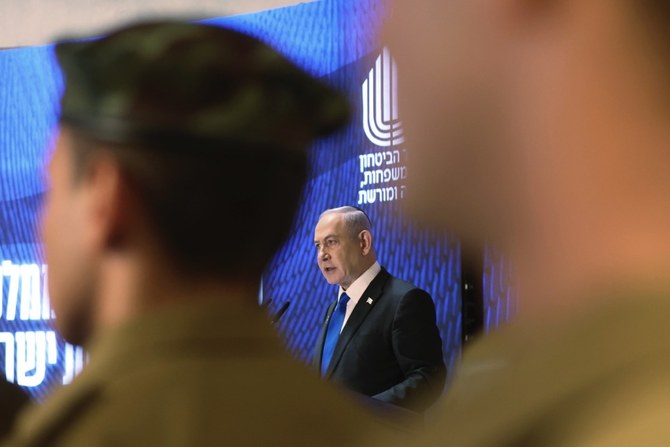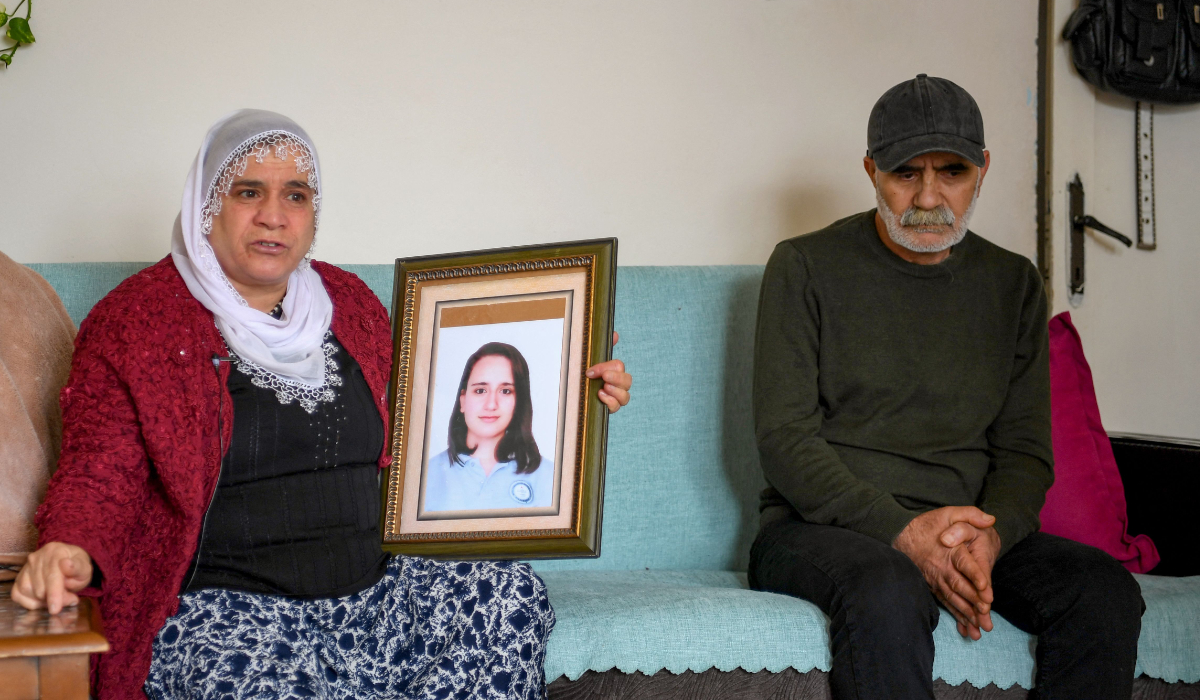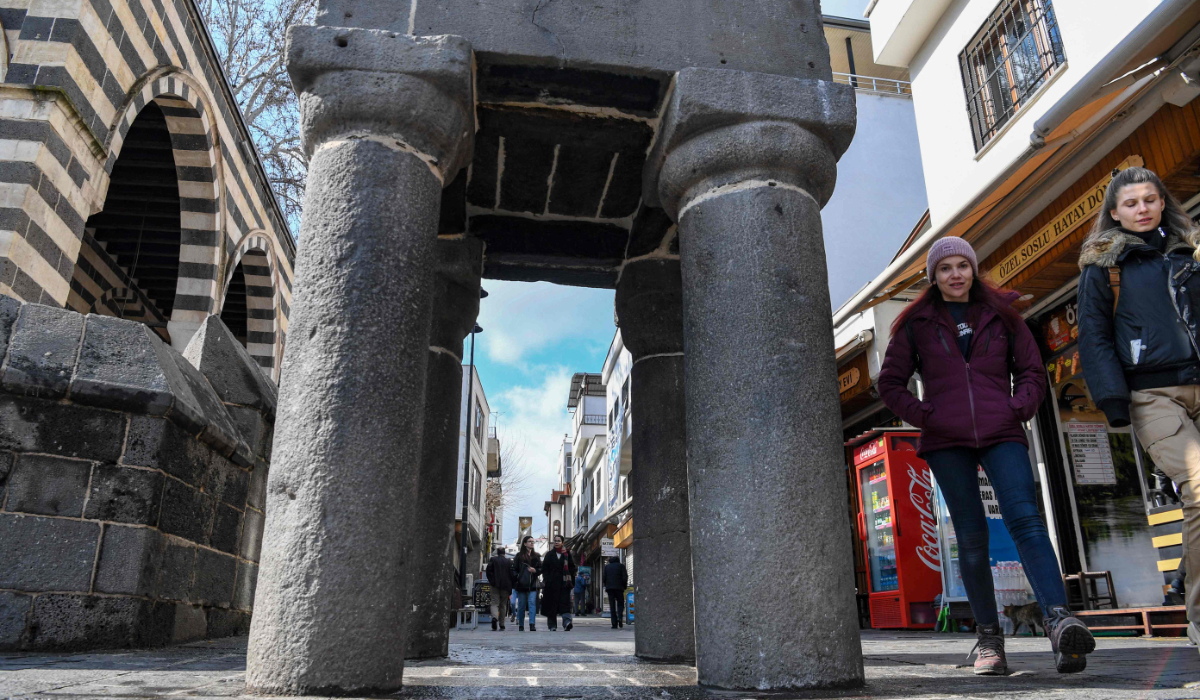LONDON: This week, before-and-after imagery released by US commercial satellite company Planet Labs showed the extent of the damage inflicted in just one day by Israeli forces on the outskirts of Rafah, close to the Egyptian border.
This is not the city of Rafah itself — yet. Awaiting a resolution of the political standoff between their government and the US, which has threatened to stop supplying ammunition if Israel invades Rafah, the 98th Airborne and the 162nd Armored divisions are massing to the south of the city.
In the satellite imagery captured on Tuesday, groups of tanks can be seen in the vicinity of the Rafah crossing, which Israeli troops occupied and closed on Monday, and grouped in several other strategic locations.
While they are waiting, however, they have been laying waste to much of the surrounding infrastructure and indulging in some symbolic wanton vandalism: in a video released on Tuesday a tank rolls over a “I love Gaza” sign near the crossing.

Netanyahu has gambled his political future on two objectives tied to a continuation of the devastating and murderous assault on Gaza — the destruction of Hamas and the killing of its top commanders. (AFP)
The contrast between the satellite images taken on Monday and Tuesday is striking. In the course of one day, hundreds of homes, commercial buildings, agricultural plots and other structures on dozens of sites either side of the Salah Al-Din highway were destroyed.
“This,” said a spokesman for the Israeli government on Tuesday, “is the beginning of our mission to take out the last four Hamas brigades in Rafah.”
But although Netanyahu has gambled his political future on two objectives tied to a continuation of the devastating and murderous assault on Gaza — the destruction of Hamas and the killing of its top commanders — after seven months of all-out warfare those objectives seem increasingly unattainable.
Despite the Israeli claim that there are four brigades in Rafah, it is unclear exactly how many operational fighters Hamas still has, or exactly where they are. It is also not clear if they have chosen, as some commentators have suggested, to make a “last stand” in Rafah, or even, after seven months of war, if they have the weapons and ammunition necessary to do so.

Groups of tanks were seen in the vicinity of the Rafah crossing. (AFP)
Even less certain is the location of Hamas military leader Yahya Sinwar, from whom nothing has been heard since the invasion of Gaza began.
Sinwar, Israel’s public enemy number one, has become a ghost, so much so that on Thursday US National Security Communications Adviser John Kirby made a public plea for him to “come clean about what his intentions are.”
Writing in The Spectator this week, Middle East analyst Jonathan Spyer suggested that, “contrary to what Israeli Prime Minister Benjamin Netanyahu might wish, Sinwar, his brother Mohammed, and the Hamas military leader Mohammed Deif are almost certainly not currently besieged in a bunker in Rafah, surrounded and obliged to either agree to the Egyptian (ceasefire) proposal or be crushed beneath the treads of the 98th and the 162nd.”
In fact, added Spyer, director of research at the Middle East Forum, “it is not even certain if the Hamas leaders and their hostages are even still in the Rafah area, or ... in some other part of the strip.”
Gaza, although barely larger than the small Mediterranean island of Malta, has nevertheless proved to be a frustrating landscape for Israeli operations.

“The only way to defeat the Hamas ideology is with a better ideology, and that is to make the two-state solution real to Palestinians,” said Gershon Baskin. (AFP)
On Thursday it emerged that even before the Oct. 7 attack, Israel had tried, and failed, to assassinate both Sinwar and Al-Deif, the commander-in-chief of Hamas’ Al-Qassam Brigades.
In remarks made to a Jewish organization in the US and broadcast on Israeli television’s Channel 12, Israel’s former military chief of staff Aviv Kochavi said a perceived “change with Hamas” in 2021 had led to the decision to try to kill the two men.
“We tried, and it’s hard,” he was reported as having said.
“In a densely populated, heavily built-up area it is very hard. So, we had been working for months in order to procure the operation but we couldn’t.”
Kochavi also added his voice to the growing chorus in Israel critical of Netanyahu’s increasingly unpopular determination to continue military operations in Gaza.

Yahya Sinwar, Israel’s public enemy number one, has become a ghost. (AFP)
“I don’t think there is a way to bring back the hostages without halting for the time being the war,” he said. Furthermore, he added, “I don’t think we can achieve complete victory in months — forget it, it will take years.”
For the Netanyahu government, however, Rafah represents a stage for political theatre — a last opportunity to declare the war won and, in the process, to ensure Netanyahu has a political future.
INNUMBERS
• 120 People taken hostage by Hamas on Oct. 7 still unaccounted for.
• 252 Israelis and foreigners taken hostage in the attack, according to Israel.
• 80,000 People known to have fled Rafah since last Monday after Israeli warning.
“They're looking for a victory,” said Yossi Mekelberg, a professor of international relations and an associate fellow of the Middle East and North Africa Program at London-based policy institute Chatham House.
“They are looking for a photo op: ‘Here is his head, we’ve cut off the head of Hamas, now it’s all over’.”
Although the message from Biden “is very clear — for the United States to even suggest imposing an arms ban on Israel is a huge thing,” Netanyahu is also facing a potential internal revolt by his right-wing cabinet members, such as National Security Minister Itamar Ben-Givr and Finance Minister Bezalel Smotrich, who oppose any ceasefire with Hamas.

Despite the Israeli claim that there are four brigades in Rafah, it is unclear exactly how many operational fighters Hamas still has. (AFP)
Ultra-religious, “they are on a different planet,” said Mekelberg. “It’s not between them and other human beings, it's between them and God. And they are telling Netanyahu if he compromises too much with Hamas they will leave the government, and that there is no point in them staying in government if we don't enter Rafah.”
Whether they would find Sinwar there is anybody’s guess, says Gershon Baskin, a former adviser to Israeli, Palestinian and international prime ministers on the Middle East peace process.
“I'm sure that he's not just sitting and waiting,” he said. “He has certainly booby-trapped tunnels and bunkers in the whole area between Rafah and Khan Younis, and maybe they also have access to places north of there. We don’t know.”
But if Sinwar is in Rafah, “from my experience with the man there is no way he is going to surrender. He will fight to the death. I think that he believes that he will never survive this war. He’s not afraid of death. In fact, he believes that it’s his duty to become a martyr and he will try to kill as many Israelis along the way as possible.”

For the Netanyahu government, however, Rafah represents a stage for political theatre. (Reuters)
According to Baskin, an all-out ground attack on Rafah would be “catastrophic, for any hostages and the civilian population. There’s no doubt about it. I have heard there are about 40,000 people left in the quadrant that Israel said they wanted people to move out of, and you have another 1.2 million at least in the city of Rafah and its surroundings.”
Humanitarian considerations aside, Mekelberg believes that, even if Rafah is attacked and razed to the ground, Sinwar is killed and victory declared, assaulting the city would be a strategic mistake — and would not deliver the hoped-for existential blow to Hamas.
“The main threat to Israel from Hamas comes from its ideology and politics, not from its military,” he told Arab News.

The contrast between the satellite images taken on Monday and Tuesday is striking. (AFP/Maxar Technologies)
“The military you can deal with. But the Israelis need to convince people that this ideology doesn’t serve the Gazan people or Palestinian people generally, and that there is an alternative that offers hope, and it is doing very badly at that right now.
“Israel needs to make Hamas ideologically and politically irrelevant and it is doing exactly the opposite, making them more and more relevant.”
Baskin agrees.
“The only way to defeat the Hamas ideology is with a better ideology, and that is to make the two-state solution real to Palestinians, to show them that their fight, their struggle for independence and dignity, is on the road to victory,” he told Arab News.
That, he added, “is the only way to defeat Hamas” and, with the right leadership in Israel, and an alternative to Mahmoud Abbas for the Palestinians, doing so would be “easy.”
“All Israel has to do is declare that it recognizes the state of Palestine, and then every other country in the world would do that as well,” he said.

“The main threat to Israel from Hamas comes from its ideology and politics, not from its military,” Yossi Mekelberg told Arab News. (AFP)
“Then what I would do is organize a regional conference, including all of our neighbors, hoping that the Saudis would participate, and asking the Americans and Europeans to join in but not to run the show, and negotiate borders and Jerusalem and refugees and economic relations.”
The stumbling block to all this, he says, is Netanyahu, “who since 2009 has done everything he can to avoid the possibility of a two-state solution and for whom this war is definitely about his own personal political interest.”
































